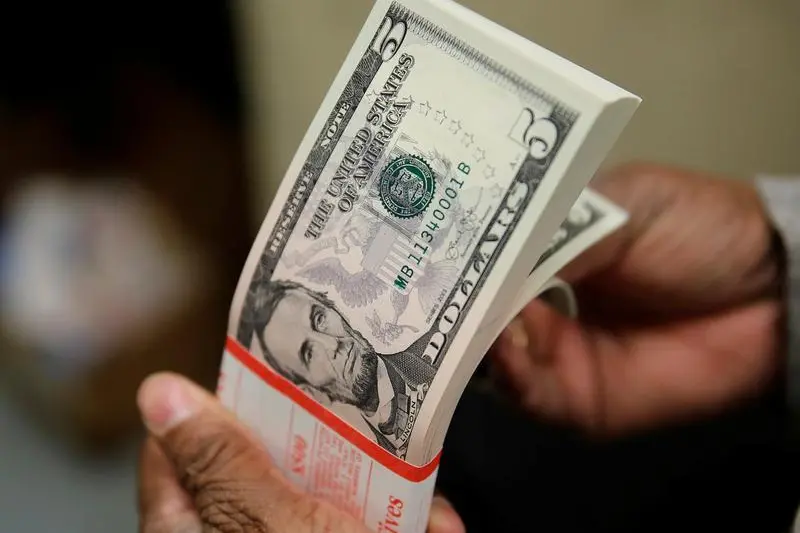PHOTO
NEW YORK- The dollar index edged higher on Thursday, backing off of a seven-week low as hopes for a coronavirus relief package ahead of the Nov. 3 U.S. elections faded and COVID-19 cases surged around the world, boosting demand for safe-haven assets like the greenback.
Investors were also digesting new U.S. jobless claims data that showed a bigger-than-expected drop, but remained at extremely high levels, indicating a slowdown in the labor market and broader economic recovery from the coronavirus pandemic as the boost from previous fiscal stimulus fades.
Negotiations toward a new coronavirus aid bill were thrown into question after Republican President Donald Trump took to Twitter late on Wednesday to accuse Democrats of being unwilling to find an acceptable compromise and amid deep opposition among Senate Republicans to a large new stimulus package.
But U.S. House of Representatives Speaker Nancy Pelosi on Thursday said negotiators were making progress and that legislation could be hammered out "pretty soon."
"All this back-and-forth between Pelosi and the White House may not actually yield anything because at the end of the day, it seems like they are running out of time," said Kathy Lien, managing director at BK Asset Management.
"The near possibility that we're going to get more bad news or at least no good news from now to the election is driving investors out of the greenback," she said.
The stimulus package is likely to come up when Trump faces off against Democratic rival Joe Biden later on Thursday in their final debate ahead of the elections.
News that Europe has seen the number of coronavirus cases surge to a record high, with Spain becoming the first Western European country to exceed 1 million infections, added to the cautious tone in world markets.
This backdrop appeared to favor the dollar, which had fallen for the last three days against a basket of other major currencies.
The dollar index was last trading at 92.893, 0.18% firmer on the day and above the 92.469 low hit on Wednesday that marked the lowest level since Sept. 2.
The euro was 0.3% lower versus the dollar at $1.1862, down from Wednesday's one-month highs of $1.18805.
"The euro has been undeservingly strong, given the significant increases in COVID-19 cases and the fact that the ECB will have no choice but to lower interest rates," said Lien.
She said she will be closely watching PMI reports from the euro zone due out on Friday, which could trigger a more aggressive decline in the euro.
The tone in currency markets was generally subdued as investors waited for new impetus.
"The U.S. presidential elections are only 12 days away, before that nobody wants to commit too much to a particular direction in euro/dollar," said Commerzbank FX analyst Esther Reichelt.
Having hit six-week highs on Wednesday amid Brexit optimism, sterling too pulled back against the U.S. currency. The British pound was last down 0.35% at $1.3103.
The Australian dollar was 0.1% softer versus the greenback at $0.7110, while the New Zealand dollar was 0.21% higher at $0.6670- up from the $0.6551 low touched on Tuesday.
Elsewhere, the Chinese yuan retreated from a 27-month high hit a day earlier on signs the authorities have become increasingly wary over the recent rapid gains in the currency.
The offshore Chinese yuan was last up 0.42% at 6.6709 per dollar.
(Reporting by John McCrank; additional reporting by Dhara Ranasinghe in London; editing by Jonathan Oatis) ((john.mccrank@thomsonreuters.com Twitter @jmccrank; 1 646 223-6643; Reuters Messaging: john.mccrank.thomsonreuters.com@reuters.net))





















